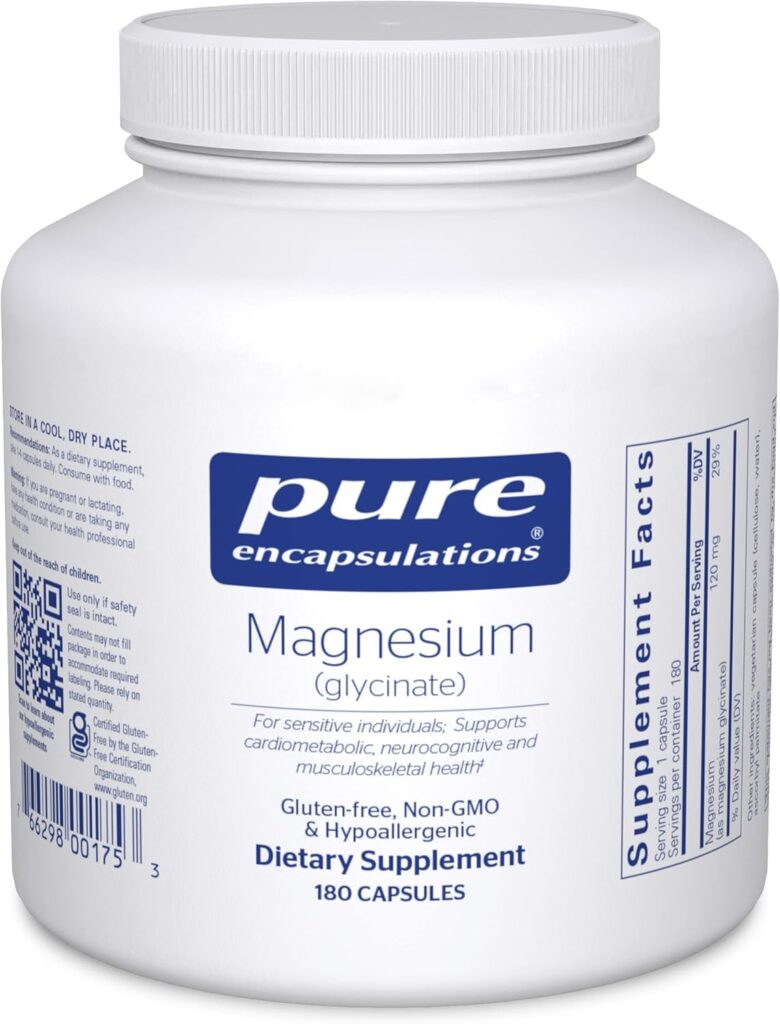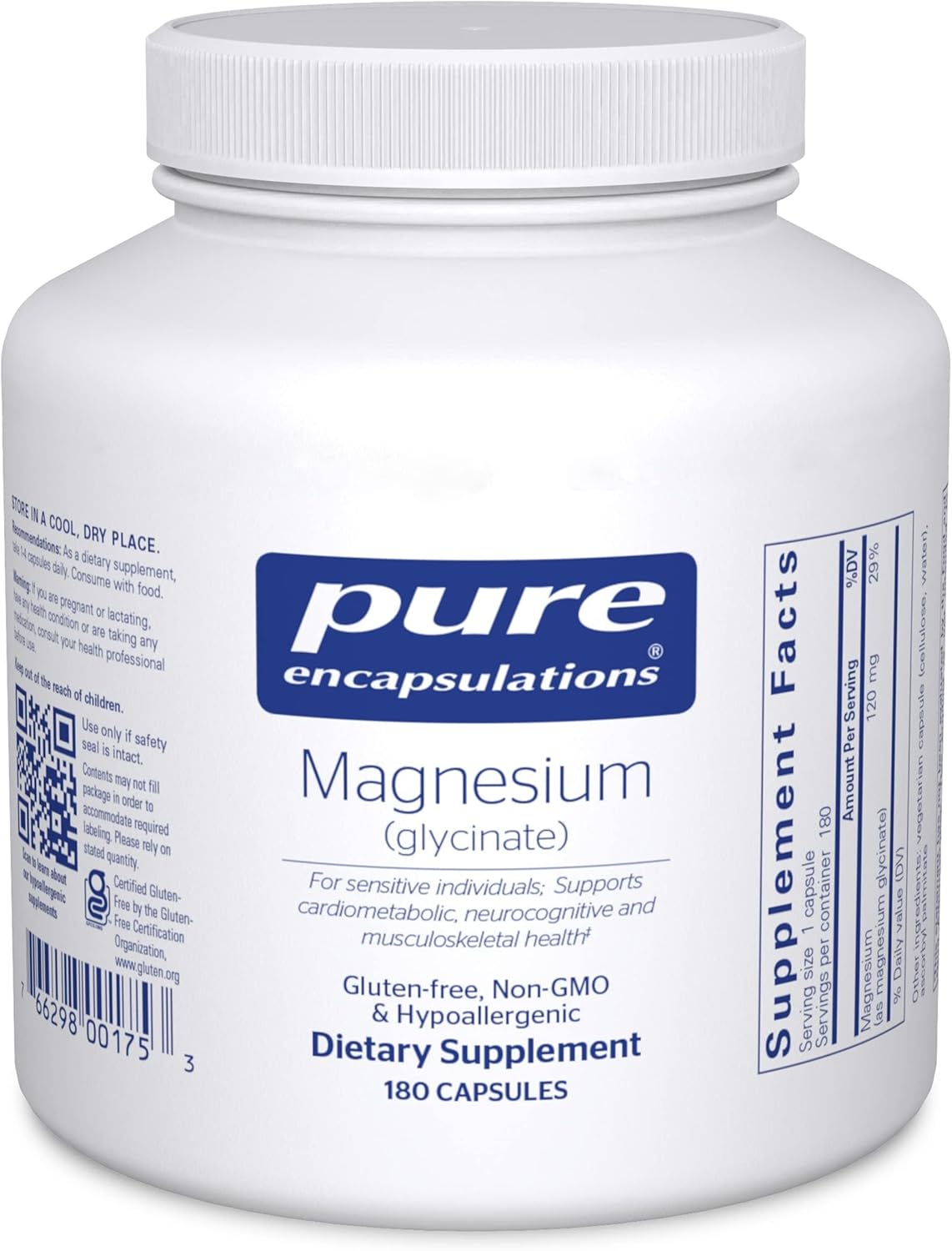Magnesium Glycinate:Know It All, An Essential and Beneficial Mineral in 2025
Magnesium glycinate is a highly bioavailable and gentle form of magnesium, an essential mineral that plays a crucial role in many bodily functions. It is an absorbable type of magnesium that might help well-being in more than one way. As well as assisting you with keeping up with ideal blood levels of magnesium, magnesium might assist with diminishing glucose and circulatory strain levels, ease side effects of tension, and further develop the best quality.
Benefits:

- Relaxation and sleep: Promotes relaxation, reduces stress, and improves sleep quality.
- Muscle relaxation: Relieves muscle cramps, spasms, and soreness.
- Anxiety and stress relief: Helps alleviate anxiety, depression, and irritability.
- Bone health: Supports bone density and strength.
- Heart health: Helps regulate blood pressure, lipid profiles, and cardiac function.
- Digestive health: Relieves constipation, IBS symptoms, and inflammation.
- Blood sugar control: Helps regulate blood sugar levels.
Uses:
- Supplementation: Take as a dietary supplement to address magnesium deficiency or insufficiency.
- Sleep aid: Use as a natural sleep aid to improve sleep quality.
- Muscle recovery: Take after exercise to relieve muscle soreness and cramps.
- Anxiety relief: Use as a natural anxiolytic to reduce stress and anxiety.
- Digestive issues: Take to relieve constipation, IBS symptoms, or inflammatory bowel disease.
When choosing a magnesium glycinate supplement, consider the following:

- Look for a bioavailable form: It is highly bioavailable and gentle on the stomach.
- Check the dosage: Typical dosages range from 200-400 mg per serving.
- Consider adding other nutrients: Some supplements combine magnesium with other nutrients like melatonin or zinc for enhanced benefits.
Remember to consult with a healthcare professional before starting any supplement regimen.
It is generally considered safe and well-tolerated. However, like any supplement, it may cause side effects, especially when taken in high doses or combined with other medications. Here are some known side effects of magnesium :
Common side effects:
- Gastrointestinal issues: Diarrhea, nausea, vomiting, stomach cramps, or bloating.
- Dizziness or lightheadedness: May occur due to magnesium’s blood pressure-lowering effects.
- Headaches: Mild headaches can occur, possibly due to changes in blood flow or relaxation.
- Fatigue or weakness: May be experienced, especially if taking high doses.
- Muscle weakness: Rarely, magnesium glycinate can cause muscle weakness or cramps.
Less common side effects:
- Allergic reactions: Rarely, some individuals may experience allergic reactions, such as hives, itching, or difficulty breathing.
- Respiratory issues: Magnesium glycinate may worsen respiratory conditions like asthma or COPD.
- Cardiovascular issues: High doses may interact with heart medications or worsen underlying conditions.
- Kidney problems: Individuals with kidney issues should consult their doctor before taking magnesium glycinate.
To minimize side effects:
- Start with a low dose: Gradually increase the dose as needed and under medical supervision.
- Monitor blood pressure and heart rate: Regularly check blood pressure and heart rate, especially if taking medications.
- Stay hydrated: Drink plenty of water to help prevent gastrointestinal issues.
- Consult a healthcare professional: Before taking magnesium glycinate, especially if you have underlying medical conditions or take medications.
Remember, it’s essential to weigh the benefits and potential side effects of magnesium glycinate and consult with a healthcare professional if you have concerns.
This Magnesium is a synthetic form of magnesium, but magnesium itself can be found in various natural sources. Here are some rich natural sources of magnesium:
- Dark leafy greens: Spinach, kale, Swiss chard, and collard greens are all high in magnesium.
- Nuts and seeds: Almonds, cashews, pumpkin seeds, and sesame seeds are good sources of magnesium.
- Legumes: Black beans, chickpeas, lentils, and kidney beans are rich in magnesium.
- Whole grains: Brown rice, quinoa, whole wheat bread, and whole grain cereals contain magnesium.
- Fish: Mackerel, salmon, and halibut are good sources of magnesium.
- Avocados: Avocados are a good source of magnesium, as well as other essential nutrients.
- Bananas: Bananas are a good source of magnesium, potassium, and other essential nutrients.
- Dried fruit: Dried apricots, prunes, and dates are good sources of magnesium.
- Tofu and tempeh: These soy products are good sources of magnesium.
- Magnesium-rich water: Some mineral water sources are rich in magnesium, such as San Pellegrino or Gerolsteiner.
While these sources contain magnesium, it’s essential to note that magnesium glycinate is a specific form of magnesium that is often used in supplements. If you’re looking to increase your magnesium intake, consider consulting with a healthcare professional to determine the best approach for your individual needs.
Recommended for patients who
- Experience anxiety, stress, or insomnia: Magnesium glycinate’s calming effects can help alleviate symptoms.
- If you have muscle cramps, spasms, or weakness, magnesium glycinate can help relax muscles and relieve cramps.
- Suffer from migraines or headaches: Magnesium glycinate may help reduce frequency and severity.
- Have cardiovascular disease or hypertension: It can help lower blood pressure and improve cardiovascular health.
- Experience digestive issues like IBS, constipation, or diarrhoea: Magnesium glycinate can help regulate bowel function.
- Have type 2 diabetes or metabolic syndrome: It may improve insulin sensitivity and glucose metabolism.
- Are undergoing chemotherapy or radiation: May help alleviate side effects like fatigue, nausea, and neuropathy.
- Have fibromyalgia or chronic fatigue syndrome: It may help reduce symptoms like muscle pain and fatigue.
- Experience menstrual cramps, PMS, or PCOS symptoms:This Magnesium can help alleviate symptoms.
- Have a magnesium deficiency or insufficiency: Magnesium glycinate can help replenish magnesium levels.
Remember, it’s essential to consult with a healthcare professional before starting this magnesium supplements, especially if you have underlying medical conditions or take medications.
Main differences between magnesium and magnesium glycinate:
Form: Magnesium is an essential mineral, while magnesium glycinate is a specific form of magnesium bound to the amino acid glycine.
- Absorption: Magnesium glycinate is more easily absorbed and bioavailable than other forms of magnesium.
- Gastrointestinal tolerance: Magnesium glycinate is gentle on the stomach and less likely to cause diarrhoea or stomach cramps compared to other forms of magnesium.
- Relaxation and calming effects: Magnesium glycinate has a more pronounced calming effect due to its ability to cross the blood-brain barrier and interact with neurotransmitters.
- Muscle relaxation: Magnesium glycinate is more effective at relaxing muscles and relieving muscle cramps, spasms, and soreness.
- Neuroprotective effects: Magnesium glycinate has enhanced neuroprotective effects due to its ability to cross the blood-brain barrier and protect against neurodegenerative diseases.
- Dosage: Magnesium glycinate typically requires a lower dosage compared to other forms of magnesium to achieve the same benefits.
- Interactions: Magnesium glycinate may have fewer interactions with medications and other supplements due to its gentle and targeted absorption.
In summary, magnesium glycinate is a highly bioavailable and gentle form of magnesium with enhanced relaxation, muscle relaxation, and neuroprotective effects.
Disclaimer: The contents of this article are intended to raise awareness about common health issues and should not be viewed as sound medical advice for your specific condition. You should always consult with a licensed medical practitioner before following any suggestions outlined in this article or adopting any treatment protocol based on the article’s contents.
If you enjoyed this article, please like and share it with your friends, and don’t forget to subscribe for more great content!
Mighty Patch Original Review 2025: A Comprehensive Look at the Hydrocolloid Acne Pimple Patch
Healthy Gut 2025:Awe-Inspiring Knowledge You Must Be Aware of



